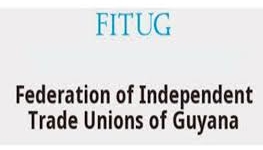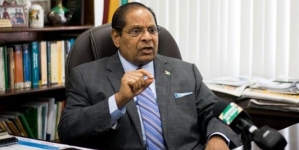Written submission by Attorney General, Basil Williams
FACTS:
- On the 2nd March, 2020 Regional and General Elections were held in Guyana.
- As a consequence of contentions that the declarations of certain Electoral Districts were lacking in credibility the Third Named Respondent undertook a Recount of all the electoral districts.
- The Third Named Respondent issued pursuant to Article 162 of the Constitution and Section 22 of the Election Law Amendment Act a Recount Order, Order No 60 of 2020 dated the 4th day of May, 2020.
- The Third Named Respondent on the 29th day of May, 2020, issued an Amended Order.
- By Order No. 60 of 2020, dated the 4th day of May, 2020, and the amended Order dated the 29th of May, 2020, the Elections Commission undertook a Recount Process of all Ballots cast at the 2nd March 2020, General and Regional Elections.
- In accordance with the aforesaid Orders and particularly with the criteria set out in Order 60 of 2020 and reproduced in Paragraph 18, objections were made in respect of ballot boxes in every Electoral District by Agents of Political Parties.
- That the aforesaid objections were recorded in a document named the Observation Report, the said document being a Statutory Document created by the Third Named Respondent.
- That ballots were counted and recorded on another document named Statement of Recount.
- On the 13th day of June, 2020 the Chief Elections Officer submitted his Report as required by Paragraph 12 of the Order No. 60 of 2020 in respect of each of the 10 (Ten) Electoral Districts.
- That in each of the Reports for the said Electoral Districts the Chief Elections Officer stated:
“Finally, the summation of anomalies and instances of voter impersonation identified in Districts [1 to 10] clearly does not appear to satisfy the criteria of impartiality, fairness and compliance with provisions of the Constitution and the Representation of the People Act, Chapter 1:03. Consequently, on the basis of the votes counted and the information furnished from the recount, it cannot be ascertained that the results for the Districts [1 to 10] meet the standard of fair and credible Elections.”
- On the 16th day of June, 2020, the Elections Commission stated it did not have the legal authority to determine the credibility of the March 2, 2020, General and Regional Elections and by extension to arrive at a final credible count as required by the aforesaid Orders.
- That on the 16th day of June, 2020, the Chairman of the Guyana Elections Commission wrote to the Chief Elections Officer requiring that the Chief Elections Officer submit to the Guyana Elections Commission his Report as required by Section 96 of the Representation of the People Act and Article 177 (2) (b) of the Constitution using the results of the recount for consideration by the Commission.
- That on the 17th June, 2020 the Applicant filed a Notice of Motion before this Honourable Court seeking:
- a) A Declaration that the GUYANA ELECTIONS COMMISSION has failed to act in accordance with the terms of the Order No. 60 of 2020 and the amended Order dated the 29th day of May, 2020, in that the GUYANA ELECTIONS COMMISSION has failed to determine a final credible count and or the credibility of the result of the General and Regional Elections held on the 2nd day of March, 2020, as required to do by Order 60 of 2020 and the amended Order dated the 29th day of May, 2020.
- b) An Order that there be an interpretation of the words “more votes are cast” in Article 177 (2) (b) of the Constitution of Guyana.
- c) An Order restraining the Chief Elections Officer from complying with the Direction of the Chairman of the Guyana Elections Commission as set out in a Letter dated the 16th day of March, 2020, to submit to the Guyana Elections Commission an Elections Report under Article 177 (2) ( b) of the Constitution of Guyana without the Guyana Elections Commission determining the final credible count and or the credibility of the General and Regional Elections held on the 2nd day of March, 2020, as required by the Order No. 60 of 2020 and the amended Order of the 29th day of March,
- d) An Order restraining the Chief Elections Officer from complying with the Direction of the Chairman of the Guyana Election Commission as set out in a Letter dated the 16th day of March, 2020, to submit an Elections Report under Section 96 of the Representation of the People Act without the Guyana Elections Commission and determining the final credible count and or the credibility of the result of the General and Regional Elections held on the 2nd day of March, 2020, as required by the Order No. 60 of 2020 and the amended Order of the 29th day of March,
- e) An Order restraining the Chief Elections Officer from submitting to the Guyana Elections Commission an Elections Report under Article 177 (2) (b) of the Constitution containing votes which are not credible within the meaning of Order No. 60 of 2020.
- f) An Order restraining the Chief Elections Officer from submitting to the Elections Commission an Elections Report under Section 96 of the Representation of the People Act, Chapter 1:03 containing votes which are not
ISSUES:
The issues to be determined herein are:
- Whether this Court has jurisdiction to deal with this Motion?
- Whether upon a true interpretation of the Article 162 of the Constitution and the Recount Order, Order 60 of 2020, the Guyana Elections Commission (GECOM) has a duty and responsibility to determine whether the 2020 General and Regional Elections were fair and credible.
iii. Whether upon a true interpretation of Article 161 and 162 of the Constitution and Order 60 of 2020 GECOM has an inherent or implied jurisdiction to cancel the 2020 elections and inform the President of such cancellation.
- Whether the Guyana Elections Commission has failed to act in accordance with the terms of the Order 60 of 2020 and the amended Order dated the 29th May, 2020 in that the Guyana Elections Commission failed to determine a final credible count or the credibility of the General and Regional Elections?
- Whether the Chairman of the Guyana Elections Commission can direct the Chief Elections Officer to submit an Elections Report under Article 177(2) (b) of the Constitution of Guyana without the Guyana Elections Commission first determining the final credible count and or the credibility of the General and Regional Elections.
- Whether the Chairman of the Guyana Elections Commission can direct the Chief Elections Officer to submit an Elections Report under section 96 of the Representation of the People Act without the Guyana Elections Commission first determining the final credible count and or the credibility of the General and Regional Elections.
LAW
- Whether this Court has jurisdiction to deal with this Motion
- It is trite law that any tribunal entertaining a matter must first establish that it has the jurisdiction to do so: Francois v Attorney General – [2002] 5 LRC 696 citing Dhajoo v Thom (1939) LRBG 262.
- In Dhajoo v Thom(1939) LRBG 262, Richards CJ at p. 265 said:
“It is, however, the first duty of every Court whether of first instance, or on appeal, before adjudicating upon any given cause or matter, to satisfy itself on its jurisdiction and if the Court is of the opinion that it does not possess jurisdiction, in whatever manner any given matter may be brought before it, it is the duty of the court, whether the question of jurisdiction is the subject of formal appeal or not, of its own motion to pronounce accordingly.”
- As regards the issue of jurisdiction, the Fourth Named Respondent contends that Article 177 (4) should be read disjunctively. On the one hand, it deals with qualifications of the president and on the other, as it pertains to the interpretation of the Constitution, it relates to questions involving the validity of the elections of the President. The case of Re Eusi Kwayana’s Application 1980 WIR 130 supports this conclusion especially at page 135 per Jhappan CJ.
- It is therefore submitted that this Court has jurisdiction to deal with the issues of interpretation raised by the Fourth Named Respondent.
- Whether upon a true interpretation of the Article 162 of the Constitution and the Recount Order, Order 60 of 2020, the Guyana Elections Commission (GECOM) has a duty and responsibility to determine whether the 2020 General and Regional Elections were fair and credible.
- Order No. 60 of 2020 itself empowers the Guyana Elections Commission to deal with issues of credibility in the recount process. This is reflected in the third and last recitals of the Order as well as paragraphs 6, 12 and 14 of the Order.
- This power is also reflected in article 162(1)(b) of the Constitution and section 22 of the Elections Laws (Amendment Act) No 15 of 2000.
iii. Whether upon a true interpretation of Article 161 and 162 of the Constitution and Order 60 of 2020 GECOM has an inherent or implied jurisdiction to cancel the 2020 elections and inform the President of such cancellation.
- It is submitted that GECOM as a Constitutional Commission/ Tribunal is a quasi-judical body. This was the ruling made in the case of All Party Hill Leaders’ Conferencev Captain M.A. Sangma & Ors on 12 September, 1977 Equivalent citations: 1977 AIR 2155, 1978 SCR (1) 393 wherein it was decided that the Elections Commission of India is a quasi-judicial body.
- On the 13th June, 2020 the Chief Elections Officer submitted his Report as required by Paragraph 12 of the Order No. 60 of 2020 in respect of each of the 10 (Ten) Electoral Districts. In each of the Reports for the said Electoral Districts the Chief Elections Officer stated:
“Finally, the summation of anomalies and instances of voter impersonation identified in Districts [1 to 10] clearly does not appear to satisfy the criteria of impartiality, fairness and compliance with provisions of the Constitution and the Representation of the People Act, Chapter 1:03. Consequently, on the basis of the votes counted and the information furnished from the recount, it cannot be ascertained that the results for the Districts [1 to 10] meet the standard of fair and credible Elections.”
- It is respectfully contended in light of the evidence that is before the Commission as contained in the Observation Reports and other submissions with supporting documentations, that GECOM ought not to request the Chief Elections Officer (CEO) to submit a report under Section 96 of the Representation of the Peoples Act Cap.1:03 pursuant to paragraph 14 of the said Order, on the ground that the irregularities, discrepancies and anomalies affected the integrity and credibility of the elections. See: – In the case of Chilima anor v Mutharika Constitutional Reference No.1 of 2019, Malawi HC 431, where there were allegations of irregularities and anomalies, it was held that the irregularities and anomalies had been so widespread, systematic and grave that the integrity of the results had been seriously compromised. Further, that the results of the elections could not be trusted as a true reflection of the will of the voters as expressed through their votes cast during the May 21st, 2019 elections.
- In this case the irregularities, anomalies and discrepancies were occasioned when the following occurred: –
* submitted, altered, varied and transmitted results in clear disregard of the process recorded in the tally sheet;
* accepted tally sheets from centers where the total number of votes cast exceeded the total number of registered voters;
* total number of used and unused ballot papers was lower than the ballot paper issued;
* the number of votes of candidates was not balancing with the total number of valid votes cast;
* Presiding Officers failed to prepare and provide summary of the final results Record of the polling process, among others.
- The five (5) member Bench imposed a duty on the Elections Commission to respond to requests by contesting parties to resolve irregularities, anomalies and discrepancies before declaring the results of the elections. The Court held that a failure to do so can amount to bias on the part of the Commission and a gross and unjustifiable dereliction of duty under the Malawian Constitution (similar to article 162(1)(b) of the Guyana Constitution) to conduct impartial elections.
- To date, no declaration has been made of the elections’ results. Since this has not occurred, the Guyana Elections Commission has jurisdiction to declare that the General and Regional Elections held on the 2nd March, 2020 are cancelled on the ground of uncovered manifest and pervasive irregularities, anomalies and discrepancies before any declaration of the results of the elections.
- Pursuant to Article 161 of the Constitution of the Cooperative Republic of Guyana the Guyana Elections Commission is responsible for, inter alia, the conduct of Elections in accordance with the Constitution, Representation of the People Act, Chapter 1:03, Laws of Guyana and such other applicable Laws.
- Article 162 (1) (a) of the Constitution provides that the functions of the Guyana Elections Commission shall be those set out in the Constitution, or such Act of Parliament as may be applicable, and expressly stipulates that the Commission “shall exercise general direction and supervision over the registration of Electors and the administrative conduct of all the elections of members of the National Assembly.”
- In the discharge of its functions under Article 162(1)(a) of the Constitution, the Commission is duty bound to deliver results that are fair and credible. However, as stated in the reports of the CEO “it cannot be ascertained that the results for the Districts [1 to 10] meet the standard of fair and credible Elections.”
- It is a decided principle of law that the Elections Commission, in furtherance of its duty to deliver results that are fair, credible and truthfully reflect the will of the people, can exercise its inherent jurisdiction to cancel an election on the ground of uncovered manifest and pervasive irregularities, anomalies and discrepancies.
- The case of Mohinder Singh Gill and Anr. Vrs. Chief Election Commissioner, New Delhi & Ors. (1978) 1 SCC 405 is instructive on this issue. In this case, the Court had to determine the amplitude of powers and width of functions to be exercised by the Election Commission under Article 324 of The Constitution Of India 1949 and whether such power included the power to cancel poll in the entire constituency. The Court held answered this issue in the affirmative and stated thus:
“The Chief Election commissioner has thus to pass appropriate orders on receipt of reports from the returning officer with regard to any situation arising in the course of an election and power cannot be denied to him to pass appropriate orders. Moreover, the power has to be exercised with promptitude. Whether an order passed is wrong. arbitrary or is otherwise invalid, relates to the mode of exercising the power and does not touch upon the existence of the power in him if it is there either under the Act or the rules made in that behalf, or under Article 324(1)…. The Commission is, therefore, entitled to exercise certain powers under Article 324 itself, on its own right, in an area not covered by the Acts and the rules
It is clear even from section 58 and section 64A that the legislature envisaged the necessity for the cancellation of poll and ordering of repoll in particular polling stations where situation may warrant such a course. When provision is made in the Act to deal with situations arising in a particular polling stage it cannot be said that if a general situation arises whereby numerous polling stations may witness serious mal-practices affecting the purity of the electoral process, that power can be denied to the Election Commission to take an appropriate decision. The fact that a particular Chief Election Commissioner may take certain decisions unlawfully, arbitrarily or with ulterior motive or in mala fide exercise of power, is not the test in such a case. The question always relates to the existence of power and not the mode of exercise of power. Although section 58 and section 64A mention “a polling station” or “a place fixed for the poll” it may, where necessary, embrace multiple polling stations.
It is true that in exercise of powers under Article 324(1) the Election Commission cannot do something impinging upon the power of the President in making the notification under section 14 of the Act. But after the notification has been issued by the President, the entire electoral process is in the charge of the Election Commission and the Commission is exclusively responsible for the conduct of the, election without reference to any outside agency. We do not find any limitation in Article 324(1) from which it can be held that where the law made under Article 32 / or the relevant rules made thereunder do not provide for the mechanism of dealing with a certain extraordinary situation, the hands of the Election Commission are tied and it cannot independently decide for itself what to do in a matter relating to an election. We are clearly of opinion that the Election Commission is competent in an appropriate case to order repoll of an entire constituency where necessary. it will be an exercise of power within the ambit of its functions tinder Article 324, The submission that there is complete lack of power to make the impugned order under Article 324 is devoid of substance.”
- The more recent case of Jay Shankar Pathak v The Election Commissioner No. 1801 of 2012 is also instructive. In this case the petitioner alleged that the action of the respondent- Elections Commission in canceling the entire process of election on the allegation of use of money and horse trading and on certain irregularity committed by the three voters during the process of casting their votes, as recommended for canceling of the election process itself, wholly without jurisdiction and is bad. The Court held at paras 26 and 27:
“In our opinion, the Election Commission did what the Hon’ble Supreme Court expects from high functionary authority like Election Commission that, even if the law and the rules are absent even then if Election Commission comes across such a situation and he is to tackle that situation then he should not remain with folded hands and pray to God for divine inspiration to enable him to exercise his functions and to perform his duties or to look to any external authority for the grant of powers to deal with the situations…
In these cases, we are of the considered opinion that the Election Commission has acted befitting to its office by taking extraordinary steps of stopping the counting promptly and stopping the result of the poll and forthwith recommended for rescinding the election notification to Her Excellency the President of India.”
- Free and fair elections are the very foundation of democratic institutions. This was stated in Rampakavi Rayappa Belagali – Vs – B.D.Jatti & Others reported in 1970 (3) SCC 147.
‘Free and fair elections are the very foundation of democratic institutions and just as it is said that justice must not only be done, but must also seem to be done; similarly, elections should not only be fairly and properly held, but also seem to be so conducted as to inspire confidence in the mind of the electors that everything has been done aboveboard and has been done to ensure free elections.’
- In light of the foregoing, it is respectfully submitted that the Guyana Elections Commission, in the execution of their duties to ensure free and fair elections that yield results that are a true reflection of the will of the people, may exercise the power to cancel the elections in the face of anomalies, irregularities and discrepancies.
- To ignore evidence of corruption and proceed with a declaration would be to undermine the integrity of the Commission and erode public confidence in the electoral process.
- When confronted with such extraordinary circumstances the Guyana Elections Commission ought to exercise its jurisdiction and declare that the General and Regional Elections held on 2nd March, 2020 are cancelled.
All of the above are most respectfully submitted.






















